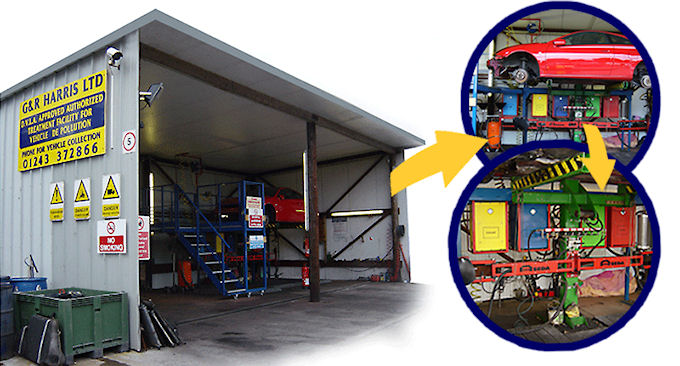- Home
- Environmental
Environmental Information
Need to dispose of an old vehicle?
Whether you deliver it to us or we collect it from you, as a DVLA Authorised Treatment Facility, Harris’s will comply with the latest environmental legislation and present you with an official DVLA Certificate of Destruction in line with the current laws on continuous taxation.
Depollution
In 2003, new EU legislation came into being governing the disposal of all scrap vehicles, The End of Life Vehicle Directive. The aim is to reduce pollution and waste that is associated with end of life motor vehicles (ELVs).
All ELVs are classified as hazardous waste and therefore, have to be depolluted prior to dismantling or crushing. This is done in our Authorised Treatment Facility, (see picture below) where all waste materials are removed or drained from each vehicle including battery, engine, oil, fuel, brake fluid etc.
We depollute all our vehicles using our Depollution Unit. Vehicles are placed on the units ramp in order to carefully drain all fluids from each vehicle in a controlled manner. The fluids drain into clearly marked seperate containers below the vehicle, ready for disposal, as demonstrated in the picture below.
Recycling
All the waste materials recovered from each vehicle during the depollution process are then stored securely in special containers, which are then collected by licensed waste management companies before being re-used, recycled or lawfully disposed of in line with environmental law.
Recycled Materials
Batteries The plastic casings are processed into new battery casings and the lead is recycled into new lead plates and other battery parts.
Oil Filters These are sent for processing to seperate the metal from the oil. The residue oil is processed along with other waste oil and the metal is recycled into new steel.
Tyres The EU landfill directive 1999/31 has banned the landfill of whole or shredded tyres. Harris’s re-sell part-worn tyres, or have tyres retreaded. Others are collected for shredding into granules for use in sports surfaces or road construction.
Waste Oil This is taken to specialist processing plants where a heating process reduces the water content, it then goes through a filteration process to remove solids and particulate material. The end product is used for fuel in industries such as power generation, brick making and road construction.
Brake Fluid Brake fluid only undergoes minor degradation during its service and generally only fails to meet performance requirements because of its hydroscopic properties, i.e. it absorbs moisture. Therefore, it is sent to specialist recyclers to restore it to its original specification and later reused.
Water The management of engine coolants, which are an aqueous solution containing glycols and smaller amounts of anti-corrosion additives, poses considerable difficulties. Recovery of glycol by distillation is in most uneconomic, so the search for new ways to recycle this material continues…
Fuel In the future we hope to be able to send both petroleum and diesel for reuse and recovery, although whether they will be accepted back into the fuel chain remains to be seen due to the quality and quantity of the material.
